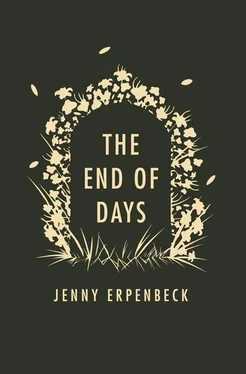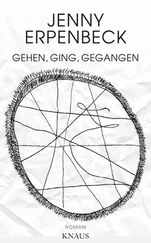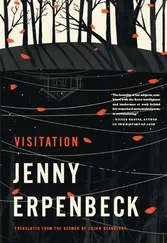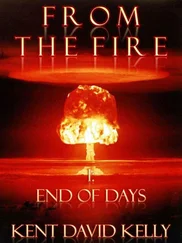Jenny Erpenbeck - The End of Days
Здесь есть возможность читать онлайн «Jenny Erpenbeck - The End of Days» весь текст электронной книги совершенно бесплатно (целиком полную версию без сокращений). В некоторых случаях можно слушать аудио, скачать через торрент в формате fb2 и присутствует краткое содержание. Год выпуска: 2014, Издательство: New Directions Publishing, Жанр: Современная проза, на английском языке. Описание произведения, (предисловие) а так же отзывы посетителей доступны на портале библиотеки ЛибКат.
- Название:The End of Days
- Автор:
- Издательство:New Directions Publishing
- Жанр:
- Год:2014
- ISBN:нет данных
- Рейтинг книги:4 / 5. Голосов: 1
-
Избранное:Добавить в избранное
- Отзывы:
-
Ваша оценка:
- 80
- 1
- 2
- 3
- 4
- 5
The End of Days: краткое содержание, описание и аннотация
Предлагаем к чтению аннотацию, описание, краткое содержание или предисловие (зависит от того, что написал сам автор книги «The End of Days»). Если вы не нашли необходимую информацию о книге — напишите в комментариях, мы постараемся отыскать её.
The End of Days — читать онлайн бесплатно полную книгу (весь текст) целиком
Ниже представлен текст книги, разбитый по страницам. Система сохранения места последней прочитанной страницы, позволяет с удобством читать онлайн бесплатно книгу «The End of Days», без необходимости каждый раз заново искать на чём Вы остановились. Поставьте закладку, и сможете в любой момент перейти на страницу, на которой закончили чтение.
Интервал:
Закладка:
But time has blurred all those things that happened for the last time without it being called the last time. At some point her mother had pinned up her hair for her for the last time. At some point she herself had washed the dishes for the last time while her sister sat at the kitchen table doing her homework. At some point she sat in Krasni Mak for the last time. At many points during her life she had done something for the last time without knowing it. Did that mean that death was not a moment but a front, one that was as long as life? And so was she tumbling not only out of this world, but out of all possible worlds? Was she tumbling out of Vienna, out of Prague and Moscow, out of Berlin, out of the Socialist sister countries and the western world? Tumbling out of the entire world, out of all the time there ever was, would be, is? But now what will happen to her son?
13
At the funeral, the urn containing his mother’s ashes sits on a pedestal up front between two flags. The red flag on the left is draped as if it were blowing to the left, and the national flag on the right as if it were blowing to the right. Whose idea was it to drape the flags to look as if a storm were rising from the urn? Ridiculous, his mother would have said.
His mother had just recently been to the hairdresser’s to have her color touched up. Now her freshly coiffed hair has been incinerated, and her face is also ash, her shoulders, too, are there in this bronze-colored canister, and her hands as well with their fleshy fingertips, her round knees, her feet, and even her toes, painted mother-of-pearl. He’s never seen his mother naked, but he’s seen how she looks when she is asleep, or how she crosses one leg over the other when she is sitting, he’s seen how she waits, how she pours herself a glass of water, how she gets up, puts on a coat, how she reaches for her handbag, how she walks. The body of his mother was the landscape he knew best among all the landscapes in the world.
14
In front of her, an ancient woman is shaking what looks like a child’s rattle made of ivory, with silver bells. She stops. Shakes. Stops. When the bells have rung for the third time, she goes into the theater.
15
In the middle, leaning up against the pedestal with the urn, is his wreath with the ribbon printed in black script: For my mother. In front of it: the wreath sent by the Central Committee of the Party: Our estimable comrade ; the wreath from the Council of Ministers: Stalwart in the struggle ; the wreath from the People’s Parliament: With Socialist salutations ; the wreath from the Magistrate of Berlin, the capital of the GDR: To an honorary citizen of our city ; the wreath sent by the Writers Union: To a great writer ; and: Unforgotten , the wreath of the Cultural Association of the GDR.
Who arranged the ribbons in such a way that you can read all the farewells?
A fortnight ago it was still a fortnight before he would be sitting here in front of her urn, but he hadn’t known it yet.
Just to the right of the urn is a little stand with a velvet cushion on which his mother’s medals are displayed: The Comrade G. Medal, the Patriotic Order of Merit, the Goethe Prize, and, twice, the Workers’ Pennant.
Ten days ago it was ten days before.
And just to the right of the urn, a table with her books.
The music they are playing is by Beethoven, according to the program. Who picked the music?
So did time keep rushing ever more rapidly away until it was gone? Why hadn’t he noticed? Why hadn’t his mother?
16
It is she herself who slices through the paper, splitting the entire stack from top to bottom at one go.
17
The Minister of Culture gives the first speech.
In Ufa his wife gave me the first two diapers for you.
Then there’s music again, this time the dirge: Victims immortal, you sank into dust. We stand here and mourn as our hearts say we must.
I like the lyrics better in Russian.
Then the second speech, given by the President of the Academy of Arts.
He’s one of those functionaries who write on the side.
One week ago today, his mother was still alive. The lees of her life were already slipping away, but she had moved around just as deliberately as ever. He had never once, for example, seen his mother running. From a distance, she had always looked like an old woman, bent over and somehow crooked, even when she was just fifty.
18
What are all these people waiting in line for? Are they giving away darkness for free? But that won’t curb anyone’s hunger.
19
At the end they play a piece by Haydn, during which everyone stands up, and her son goes to the front of the room in order to carry his wreath himself, as arranged with the funeral director. The urn, the velvet cushion with his mother’s medals, the books, the flags, and the official wreaths are picked up by soldiers of the Guards Regiment and carried, at the head of the funeral procession, to the gravesite. The son, in his role as first mourner, walks right behind the soldier carrying the urn, but because the urn-bearer is leading the procession so slowly, he has to pay attention not to step on the man’s heels. Is the Guards Regiment trying to compel the guests to assume a mournful state with this slow pace? Is the Guards Regiment standing guard over the mourners’ sentiments to ensure that the officially prescribed levels of grief are maintained?
20
From the darkness a small hand reaches out to her, something yellow in its palm. Ah, finally Sasha is handing her the lemon she’s been waiting for all this time.
21
When they reach the grave, the flag bearers dip their two flags while the urn is lowered into the pit. Forward, brothers and sisters, and the Last Judgment let us face. Oops, must have misheard — he knows perfectly well that the trumpets of the working class call the brothers and sisters to the last fight, not the Last Judgment. But isn’t the last fight death? The Internationa-a-le. Unites. The hu. Man race.
The son now takes up position, as arranged, to the left of the grave, behind him the table with his mother’s books. On the other side of the grave, the velvet cushion with the medals has been set on a pedestal again, and between the medals and the grave stands a cemetery worker offering the mourners rose petals from five baskets.
Anyone who joins this line must first pass by the cushion with his mother’s medals, then the cemetery worker, then the grave with the little bronze-colored pot at the bottom, finally arriving before him, the only son of the deceased.
The son shakes hands.
He shakes the hand of the President’s daughter and the hand of the President himself, shakes the hand of the artistic director of the Volksbühne Berlin, shakes many hands of famous writers, famous sculptors, and famous composers, he shakes the hand of the woman with rheumatism, the hand of the Deputy Ambassador of the Soviet Union in Berlin, Capital of the GDR, and also the hand of the brigade leader of the Salad Division of the fish-processing plant Sassnitz; he shakes the small hands of pioneers, the young hands of women who perhaps want to be writers themselves some day, and the old hands of comrades who knew his mother from Moscow, Prague, or Ufa.
At the very end of the reception line, he holds out his hand to a man he doesn’t know, and this man looks at him with his own gray-blue eyes, the mouth of the man looks exactly like his own mouth that he sees every morning in the mirror. With exactly the same sort of raspy voice he himself has, the man, after clearing his throat, utters his heartfelt condolences, except that his heartfelt condolences sound different from those of the others — they’re called soboleznovaniya — reminding the son so abruptly of his own Russian childhood, it’s as if his memory were a curtain suddenly ripping in two.
Читать дальшеИнтервал:
Закладка:
Похожие книги на «The End of Days»
Представляем Вашему вниманию похожие книги на «The End of Days» списком для выбора. Мы отобрали схожую по названию и смыслу литературу в надежде предоставить читателям больше вариантов отыскать новые, интересные, ещё непрочитанные произведения.
Обсуждение, отзывы о книге «The End of Days» и просто собственные мнения читателей. Оставьте ваши комментарии, напишите, что Вы думаете о произведении, его смысле или главных героях. Укажите что конкретно понравилось, а что нет, и почему Вы так считаете.












